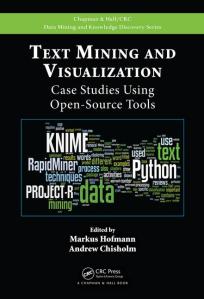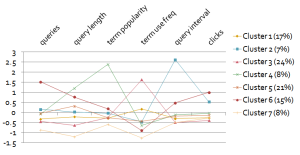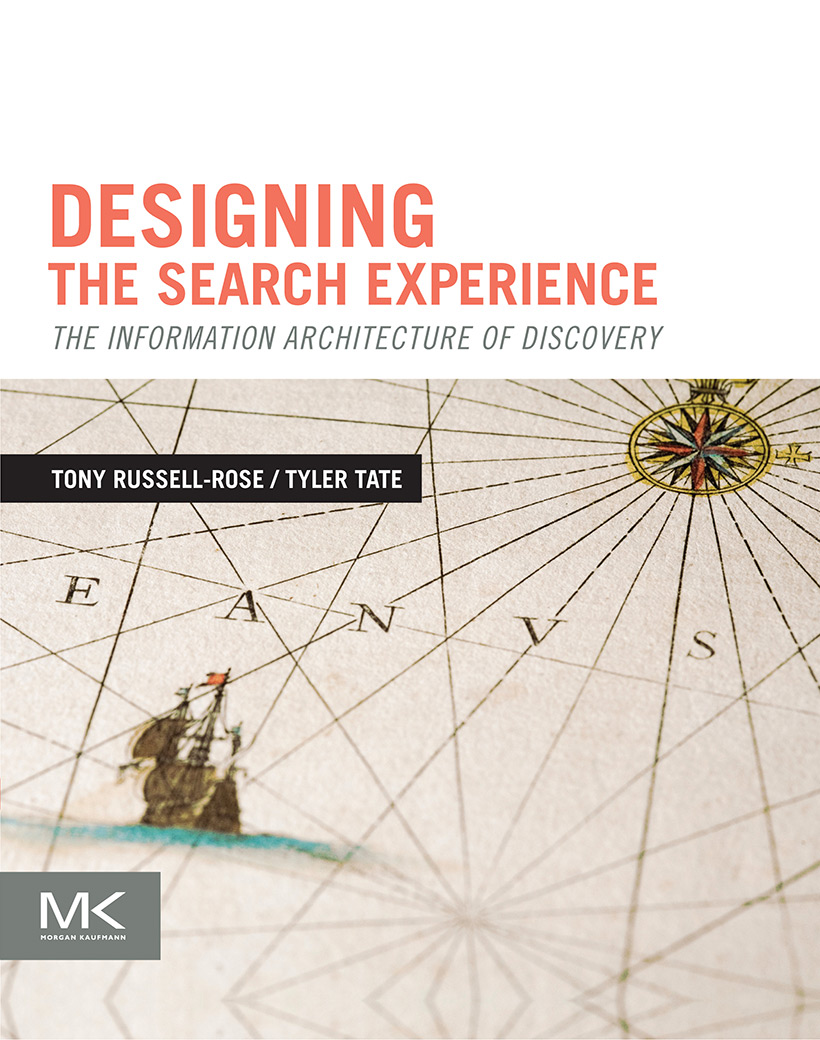Have you ever had that moment when you’ve seen something out of the corner of your eye, then turned to look but it’s gone? We’re left feeling cheated, as if some magic took place that was never intended for our eyes. But the reality is often more prosaic: cells in the human retina are arranged such that movement and contrast are better perceived around the peripherae, while the central region is better suited to colour and detail. It’s a simple explanation, but one that reminds us that in order to better understand, we sometimes need to see in different ways.
Posts Tagged ‘Information visualization’
New views, new insights: data visualisation to optimise search and discovery
Posted in Search, Text analytics, User experience, tagged 2Dsearch, advanced search, Boolean search, Information visualization, search strategies on July 2, 2019| Leave a Comment »
Searching in the Tower of Babel
Posted in Search, Text analytics, User experience, tagged 2Dsearch, advanced search, Boolean search, Information visualization, search strategies on May 28, 2019| Leave a Comment »
You may have noticed on this blog that I’ve been busy with a number of things just recently, but I’m pleased to report that we’ve been continuing to add useful features to 2dSearch, and one of them in particular deserves a shout out here.
As you may know, many professions need to perform searches that are comprehensive, accurate and repeatable, using strategies that search across multiple databases with platform-specific syntax and operators. For example, a recruiter looking to fill a particular data science role may want to search LinkedIn, Stackoverflow, Github, and other social forums to find suitable candidates. Likewise, a clinician or information professional performing a systematic literature review may need to search numerous databases such as PubMed, Embase, Web of Science, PyscINFO, and more. In each case, their search query has to be manually ‘translated’ to the syntax and user interface of each database. All of this is tedious, error-prone, and inefficient.
Rethinking ‘Advanced Search’: A New Approach to Complex Query Formulation
Posted in Search, Text analytics, User experience, tagged 2Dsearch, advanced search, Boolean search, Information visualization, search strategies on April 17, 2019| Leave a Comment »
I am delighted to announce publication of our latest open-access scholarly paper ‘Rethinking ‘Advanced Search’: A New Approach to Complex Query Formulation‘, which has just been published in the proceedings of the 41st European Conference on Information Retrieval (ECIR) in Cologne. This work is a collaboration with Jon Chamberlain and Udo Kruschwitz of Essex University, and accompanies our demo at the event.
The paper focuses on the application of query visualisation to structured searching and in particular the challenges associated with the recruitment profession, and hopefully complements some of the more opinion or design-oriented posts on this site. I’ve appended the abstract below. For free access to a copy, visit the ECIR website.
A Visual Approach to Query Formulation for Systematic Search
Posted in Search, User experience, tagged 2Dsearch, advanced search, Boolean search, Information visualization, search strategies on March 21, 2019| Leave a Comment »
I am delighted to announce publication of our latest open-access scholarly paper ‘A Visual Approach to Query Formulation for Systematic Search‘, which has just been published in the proceedings of the 4th ACM SIGIR Conference on Human Information Interaction and Retrieval. This work is a collaboration with Jon Chamberlain of Essex University and Farhad Shokraneh of Nottingham University, and accompanies our demo at the event.
The paper focuses on the application of query visualisation to healthcare information, and hopefully complements some of the more opinion or design-oriented posts on this site. I’ve appended the abstract below. For free access to a copy, visit the ACM Digital Library.
Text Mining and Visualization
Posted in Text analytics, tagged Information visualization, log analysis, natural language processing, NLP, opinion mining, sentiment analysis on March 15, 2016| 1 Comment »
I received a pleasant surprise in the post today: my personal copy of Text Mining and Visualization: Case Studies Using Open-Source Tools, edited by Markus Hofmann and Andrew Chisholm. Now I don’t normally blog about books, since as editor of Informer there was a time when I would be sent all manner of titles for inspection and review. But I’ll make an exception here. This is partially since Chapter 7 is my own contribution (on mining search logs), as discussed in my earlier blog posts. This is complemented by 11 other chapters, covering a variety of topics organised into four sections:
Thinking outside the search box
Posted in Search, User experience, tagged 2Dsearch, Information seeking, Information visualization, search strategies on January 26, 2016| 1 Comment »
 A little while ago I posted a piece examining some of the shortcomings in the way that search strategies are currently expressed; arguing that the approach essentially hasn’t changed in decades. Moreover, it is predicated on a rather primitive notation that owes much to first generation basic, relying on arbitrary concepts such as line numbers to convey structure and organisation.
A little while ago I posted a piece examining some of the shortcomings in the way that search strategies are currently expressed; arguing that the approach essentially hasn’t changed in decades. Moreover, it is predicated on a rather primitive notation that owes much to first generation basic, relying on arbitrary concepts such as line numbers to convey structure and organisation.
EuroHCIR 2014 – deadline approaching!
Posted in Events, Search, User experience, tagged Exploratory search, HCIR, Human–computer information retrieval, Information Retrieval, Information seeking, Information visualization on July 22, 2014| Leave a Comment »

The event itself is on 13 September at BCS London, with a poster session/social scheduled for the evening before. I’ve appended a summary of the call for papers below, and further details can be found at the EuroHCIR 2014 website. Hope to see you there!
Mining search logs for usage patterns (part 2)
Posted in Search, Text analytics, User experience, tagged Information Retrieval, Information seeking, Information visualization, log analysis, search logs, search strategies, User segmentation on June 3, 2014| Leave a Comment »
In a previous post I discussed some initial investigations into the use of unsupervised learning techniques (i.e. clustering) to identify usage patterns in web search logs. As you may recall, we had some initial success in finding interesting patterns of user behaviour in the AOL log, but when we tried to extend this and replicate a previous study of the Excite log, things started to go somewhat awry. In this post, we investigate these issues, present the results of a revised procedure, and reflect on what they tell us about searcher behaviour.
Mining search logs for usage patterns (part 1)
Posted in Search, Text analytics, User experience, tagged Information Retrieval, Information seeking, Information visualization, log analysis, search logs, search strategies, User segmentation on April 24, 2014| 5 Comments »
As I mentioned in a previous post I’ve recently been looking into the challenges of search log analysis and in particular the prospects for deriving a ‘taxonomy of search sessions’. The idea is that if we can find distinct, repeatable patterns of behaviour in search logs then we can use these to better understand user needs and therefore deliver a more effective user experience.
We’re not the first to attempt this of course – in fact the whole area of search log analysis has an academic literature which extends back at least a couple of decades. And it is quite topical right now, with both ElasticSearch and LucidWorks releasing their own logfile analysis tools (ELK and SiLK respectively). So in this post I’ll be discussing some of the challenges in our own work and sharing some of the initial findings.
A taxonomy of search sessions
Posted in Search, Text analytics, User experience, tagged Information Retrieval, Information seeking, Information visualization, log analysis, search logs, search strategies, User segmentation on March 18, 2014| 1 Comment »
 Over the last few months I have been working with Paul Clough and Elaine Toms of Sheffield University on a Google-funded project called ‘A Taxonomy of Search Sessions’. A session, in case you’re wondering, is defined as a period of continued usage between a user and a search application. So if you spend a while Googling for holiday destinations, that’s a session. Sessions are interesting because they form a convenient unit of interaction with which to study usage patterns, and these can provide insights that drive improved design and functionality.
Over the last few months I have been working with Paul Clough and Elaine Toms of Sheffield University on a Google-funded project called ‘A Taxonomy of Search Sessions’. A session, in case you’re wondering, is defined as a period of continued usage between a user and a search application. So if you spend a while Googling for holiday destinations, that’s a session. Sessions are interesting because they form a convenient unit of interaction with which to study usage patterns, and these can provide insights that drive improved design and functionality.









